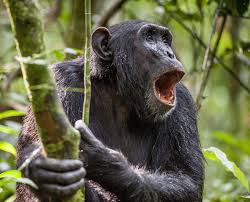In a groundbreaking discovery, scientists have captured compelling video footage of wild chimpanzees in Uganda performing rudimentary first aid procedures, shedding new light on the complexity of primate intelligence and social behavior. This unprecedented evidence suggests that these remarkable animals may possess a form of problem-solving ability and social awareness previously thought to be exclusive to humans and some other species.
The Discovery
The footage was recorded in the Kibale National Park, a renowned sanctuary for primates, during an extensive field study conducted by a team of primatologists from the University of Sussex and Uganda Wildlife Authority. Over several months, researchers observed a group of wild chimpanzees interacting with an injured member who had sustained a deep cut on its arm, likely from a thorn or branch.
What caught the scientists’ attention was a series of behaviors that resembled basic first aid. The chimpanzees appeared to recognize the injury and took actions to clean and protect the wound. They used leaves to cover the injury, possibly acting as a makeshift bandage, and in some cases, they removed debris from the wound using their teeth or other tools. These behaviors were documented in multiple instances, suggesting that they were not accidental or random.
Evidence of Intent and Social Cooperation
While primates are known for their advanced social structures and problem-solving skills, the observed behaviors in this case are particularly noteworthy. The chimpanzees seemed to demonstrate an understanding of injury and took steps to mitigate pain or prevent infection. Such actions imply a form of proto-medical behavior, which challenges previous assumptions that first aid is uniquely human.
Dr. Jane Goodall, a renowned primatologist, commented on the findings: “This evidence suggests that wild chimpanzees are capable of recognizing injuries and taking actions to aid their injured group members. It points to a level of social cognition and empathy that we are only beginning to understand.”
Implications for Primate Cognition and Evolution
The observations align with a growing body of research indicating that primates possess complex cognitive abilities, including empathy, understanding of cause and effect, and cultural transmission of behaviors. The documented first aid behavior could be a survival strategy, enhancing the chances of injured individuals recovering and maintaining group cohesion.
Some scientists argue that these behaviors might be learned socially, passed down through generations—similar to human medical practices—highlighting the potential for cultural traditions among wild primates. The idea that such behaviors could be part of a “proto-medical” repertoire opens new avenues for understanding the evolution of intelligence and social care in primates.
Broader Significance and Future Research
This discovery has profound implications beyond primatology. It underscores the importance of protecting wild populations and their habitats, where such complex behaviors occur naturally. It also raises ethical questions about how humans perceive animal intelligence and emotional capacities.
Future research aims to determine whether these first aid behaviors are widespread among other chimpanzee groups or unique to this community in Uganda. Researchers also plan to explore whether similar behaviors are observed in other primate species, which could suggest a broader evolutionary trend.
Conclusion
The filmed instances of wild chimpanzees in Uganda performing first aid-like behaviors mark a significant milestone in our understanding of animal intelligence and social complexity. These findings challenge traditional views of primates as solely instinct-driven animals and highlight the sophisticated cognitive and empathetic abilities that enable them to care for their injured peers. As science continues to uncover the depths of primate cognition, it becomes increasingly clear that the boundaries between human and animal intelligence are more intertwined than previously imagined.
Email Us on editorial@nnafrica.com












